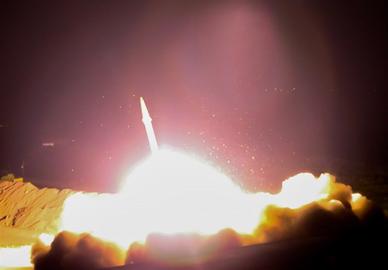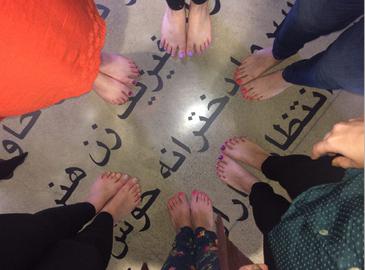Iran’s Revolutionary Guards (IRGC) announced on Sunday, June 18 it had attacked ISIS positions in Syria by launching six missiles from inside Iran — retaliation for the terrorist group’s double attacks in Tehran on June 7.
ISIS had claimed credit for the terror attacks on the Iranian parliament and the mausoleum of Ayatollah Khomeini that left 18 dead and many injured.
The missiles used in last night’s attack were mid-range, ground-to-ground missiles and were launched from the Revolutionary Guards’ bases in the western provinces of Kurdistan and Kermanshah. Iranian news services published conflicting reports about the types of missiles used in the operation. According to Mehr News Agency, they were Shahab-3 ballistic missiles with a range of 800 to 1,200 kilometers (745 miles), but Fars News Agency reported that the missiles used were Zolfaqar and Qiam-class missiles.
The Guards issued a statement that said that the missiles “targeted the headquarters, meeting place and suicide car assembly line...of ISIS terrorists” in the province of Deir al-Zour, and that all the missiles fired had hit their designated targets, inflicting an “extensive” amount of damage and casualties on ISIS. Tasnim News Agency reported that one of the dead was Sa’ad al-Hosseini, also known as Abu Sa’ad, a Saudi Arabian high commander of ISIS.
On the morning of Monday, June 19, news agencies Tasnim and Fars, both of which are closely affiliated with the Guards, published photographs they claimed showed target areas after the attack. According to Brigadier General Amir Ali Hajizadeh, commander of the Guards’ Aerospace Force, the photos were taken by drones launched near the Syrian capital of Damascus.
The website Khabar Online reported that the missiles had hit the city of al-Mayadeen. Critics accused the IRGC of attacking populated areas that were certain to result in civilian casualties.
Foreign Ministry Spokesman Bahram Ghasemi described the attack as a “little slap on the face” and said that the attack had been carried out with the knowledge of the Syrian government.
Foreign Minister Mohammad Javad Zarif himself stepped in to defend the missile attack. “Iran's missile capability protects its citizens in lawful self-defense and advances common global fight to eradicate ISIS & extremist terror," he tweeted on Monday.
IRGC cautioned that the missile strikes were just a warning to deter any further action by the terrorists. Clearly referring to Saudi Arabia, the statement warned “terrorists and their regional and trans-regional supporters” that they would be “engulfed by its revolutionary wrath and flames of the fire of its revenge” if they dared repeat such a heinous and “dirty move” in the future.
Prior to the attacks, Iran had blamed Saudi Arabia for the twin terrorist attacks in Tehran. “We know we are a main target of Iran,” Saudi Defense Minister Mohammed bin Salman al-Saud had said on May 2 during an interview. “We will not wait for it to become a battle in Saudi Arabia. We will work to make it a battle for Iran.”
Kurdistan and Kermanshah: Symbolic Launch Pads
“International and regional supporters of terrorists must take the warning of the missile operations seriously,” said General Ramezan Sharif, IRGC’s spokesman. He emphasized that the two provinces of Kurdistan and Kermanshah were intentionally chosen for launching the missiles. The two provinces have Sunni-majority populations, and it had been reported that some of the terrorists involved in the Tehran attacks were from Kurdistan and Kermanshah. According to the Guards, the decision to launch the missiles from the provinces clearly demonstrated that people from the areas supported the government, as well as “Iran’s national security and territorial integrity.”
A vast number of Iranian politicians and officials have defended the missile attack. Hossein Amir Abdollahian, advisor to the Parliament Speaker Ali Larijani, called the attack “a soft warning.” Hamid Baeidinejad, Iran’s ambassador to the UK, praised the missile strikes and added: “Missile attacks against the ISIS military base in Syria manifested the will and capacity of Iran to fight against terrorism and security threats.”
And many officials had further warnings, heading off any further criticism.“This was just a start in taking revenge on ISIS,” tweeted Mohsen Rezaee, secretary of the Expediency Council.
So will Iran launch another such attack? Is this really just the start of the aggression? According to Rasoul Sanaeizadeh, the Revolutionary Guards’ political deputy commander, the decision rests with the High National Security Council, the armed forces’ chiefs of staff and Revolutionary Guards’ command. But Aladdin Broujerdi, head of parliament’s National Security Committee described the attack as “the start of a new phase in Iran’s strategy in confronting terrorism.” And he added: “We will blast the terrorist position whenever the situation calls for it.”
visit the accountability section
In this section of Iran Wire, you can contact the officials and launch your campaign for various problems

























comments